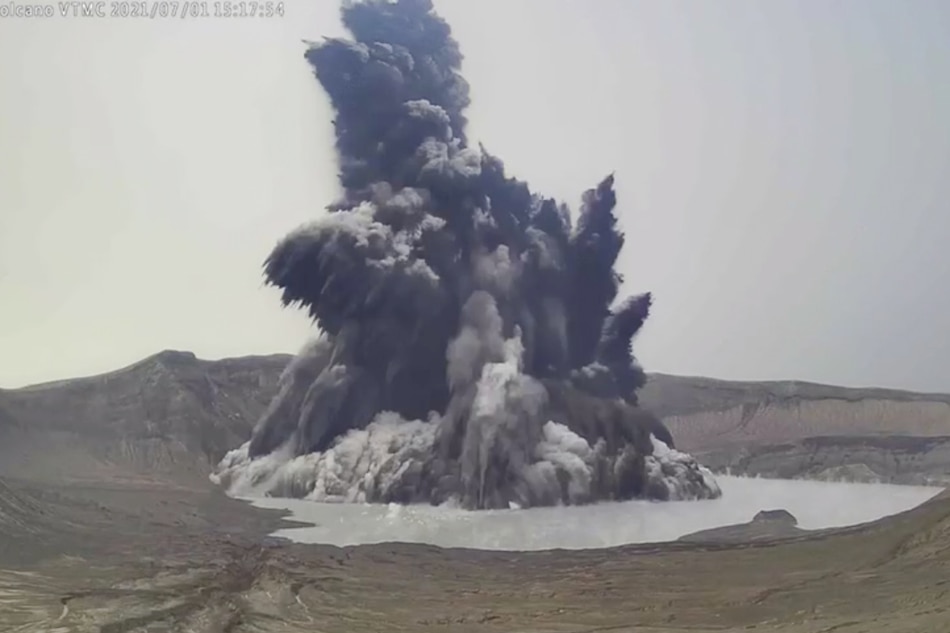EXPLAINER: What is phreatomagmatic eruption? | ABS-CBN
ADVERTISEMENT

Welcome, Kapamilya! We use cookies to improve your browsing experience. Continuing to use this site means you agree to our use of cookies. Tell me more!
EXPLAINER: What is phreatomagmatic eruption?
EXPLAINER: What is phreatomagmatic eruption?
ABS-CBN News
Published Jul 02, 2021 09:07 AM PHT
|
Updated Jul 02, 2021 09:31 AM PHT
MANILA—Taal Volcano on Thursday spewed a kilometer-high phreatomagmatic plume that prompted the state volcanology agency to raise the status over the volcano to Alert Level 3.
MANILA—Taal Volcano on Thursday spewed a kilometer-high phreatomagmatic plume that prompted the state volcanology agency to raise the status over the volcano to Alert Level 3.
Thousands of residents in Batangas have been evacuated to safety amid what the Philippine Institute of Volcanology and Seismology (Phivolcs) called "magmatic unrest" at the volcano's main crater.
Thousands of residents in Batangas have been evacuated to safety amid what the Philippine Institute of Volcanology and Seismology (Phivolcs) called "magmatic unrest" at the volcano's main crater.
But what is a phreatomagmatic eruption?
But what is a phreatomagmatic eruption?
According to professor Mahar Lagmay, executive director of the University of the Philippines Resilience Institute, this type of eruption is a result of new magma and water interacting.
According to professor Mahar Lagmay, executive director of the University of the Philippines Resilience Institute, this type of eruption is a result of new magma and water interacting.
ADVERTISEMENT
"'Yong tubig do'n sa lawa, do'n sa isla ay nag-contact, tumama, nagdikit doon sa magma. Dahil mainit 'yong magma at mas malamig 'yong tubig, nagkaroon ng explosive eruption," Lagmay said.
"'Yong tubig do'n sa lawa, do'n sa isla ay nag-contact, tumama, nagdikit doon sa magma. Dahil mainit 'yong magma at mas malamig 'yong tubig, nagkaroon ng explosive eruption," Lagmay said.
(The water from the lake or island came in contact with the magma. Because magma is hot and water is cold, there was an explosive eruption.)
(The water from the lake or island came in contact with the magma. Because magma is hot and water is cold, there was an explosive eruption.)
The first phreatomagmatic eruption at Taal Volcano occurred at 3:16 p.m., which lasted for 5 minutes and generated a kilometer-high dark plume.
The first phreatomagmatic eruption at Taal Volcano occurred at 3:16 p.m., which lasted for 5 minutes and generated a kilometer-high dark plume.
It was followed by 4 short phreatomagmatic bursts that lasted no longer than 2 minutes each and produced short jetted plumes, which rose 200 meters above the main crater lake.
It was followed by 4 short phreatomagmatic bursts that lasted no longer than 2 minutes each and produced short jetted plumes, which rose 200 meters above the main crater lake.
If the heated groundwater drives the eruption, it is called phreatic eruption, Lagmay said. When magma is erupted, it's called magmatic eruption.
If the heated groundwater drives the eruption, it is called phreatic eruption, Lagmay said. When magma is erupted, it's called magmatic eruption.
ADVERTISEMENT
Should the public expect stronger eruptions?
Should the public expect stronger eruptions?
Based on historical records of eruptions of Taal, Lagmay said the intensity had waned over time.
Based on historical records of eruptions of Taal, Lagmay said the intensity had waned over time.
In 1965, Taal's volcanic explosivity index, a numeric scale that measures the relative explosivity of historic eruption, was VEI 4. It erupted in the subsequent years until 1970 to VEI 1.
In 1965, Taal's volcanic explosivity index, a numeric scale that measures the relative explosivity of historic eruption, was VEI 4. It erupted in the subsequent years until 1970 to VEI 1.
"Kung titignan 'yong ganitong historical eruptions ng Taal . . . 'yong malakas ay 'yong nauna," he said.
"Kung titignan 'yong ganitong historical eruptions ng Taal . . . 'yong malakas ay 'yong nauna," he said.
(If we look at the historical eruptions of Taal . . . The strong one is the first eruption.)
(If we look at the historical eruptions of Taal . . . The strong one is the first eruption.)
ADVERTISEMENT
The volcano, which sits on an island surrounded by a lake in Batangas province, had a steam-driven eruption on January 12, 2020, triggering an ash fall that reached parts of Metro Manila and nearby provinces.
The volcano, which sits on an island surrounded by a lake in Batangas province, had a steam-driven eruption on January 12, 2020, triggering an ash fall that reached parts of Metro Manila and nearby provinces.
The eruption displaced more than 700,000 people in Central Luzon, Calabarzon and Metro Manila. Damage to infrastructure and agriculture in the provinces of Batangas, Cavite and Laguna was pegged at P3.4 billion
The eruption displaced more than 700,000 people in Central Luzon, Calabarzon and Metro Manila. Damage to infrastructure and agriculture in the provinces of Batangas, Cavite and Laguna was pegged at P3.4 billion
Taal is among 24 active volcanoes in the Philippines and has recorded 33 eruptions since 1572. Its worst eruption was in 1911 where some 1,335 people were killed, data from Phivolcs showed.
Taal is among 24 active volcanoes in the Philippines and has recorded 33 eruptions since 1572. Its worst eruption was in 1911 where some 1,335 people were killed, data from Phivolcs showed.
Read More:
Teleradyo
Sakto
Taal Volcano
phreatomagmatic eruption
phreatic eruption
magmatic eruption
Mahar Lagmay
Phivolcs
volcano
eruption
ADVERTISEMENT
ADVERTISEMENT



